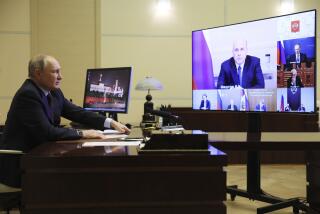Soviets Vented Radioactive Debris in Atmosphere, U.S. Charges
- Share via
WASHINGTON — The Reagan Administration accused the Soviet Union on Thursday of violating the nuclear test ban treaty by allowing radioactive debris to escape into the atmosphere and drift beyond Soviet territory after an underground test blast on the Arctic island of Novaya Zemlya.
State Department spokesman Charles Redman said the venting did not cause “calculable health, safety or environmental risk,” but he said the treaty prohibits a nation from allowing any radiation to reach other countries.
“The principal point I’m trying to make here is that when radioactive debris in whatever amounts go beyond your national territory, you are in violation of the limited test ban treaty,” Redman said.
He said the leak, which occurred after an Aug. 7 test, was the second illegal venting of a Soviet underground test this year, following one last February.
By calling attention to the Soviet violation, the Administration seemed to be trying to recoup the public relations gains that Moscow scored by its 18-month unilateral moratorium on nuclear tests. The Soviets resumed testing last February because the United States refused to join in the suspension that Moscow ordered in August, 1985.
Redman said that since the Soviet test on Novaya Zemlya, an island above the Arctic Circle, Sweden has reported increased radiation levels in Lapland, possibly as a result of drifting radioactive ash. Redman declined to say whether the leakage may have affected any other countries.
The United States conducted a nuclear test of its own Thursday at the Nevada test site. Redman said no debris escaped.
“For more than a decade, there have been no ventings and only two incidents of local seepage of radioactive gasses at the Nevada test site . . . (which) did not result in any spread of radioactivity beyond our national borders,” he said.
In Moscow, the Tass news agency reported that the Soviet Union has been using nuclear blasts to test a new method for extracting oil from deep layers of rock.
Tass quoted Alexei Zolotov, head of the Soviet Geology Ministry’s oil and gas administration, as saying that an explosion was set off Wednesday in a deep hermetically sealed well to prevent the escape of radiation.
Zolotov said the technique is intended to stimulate the flow of oil and gas from low-permeability rock lying at great depths. Soviet officials have said they hope to boost productivity by 50% in some areas by using the nuclear extraction technique.
Moscow has announced five such nuclear experiments conducted “in the interests of the national economy” this year.
More to Read
Sign up for Essential California
The most important California stories and recommendations in your inbox every morning.
You may occasionally receive promotional content from the Los Angeles Times.













